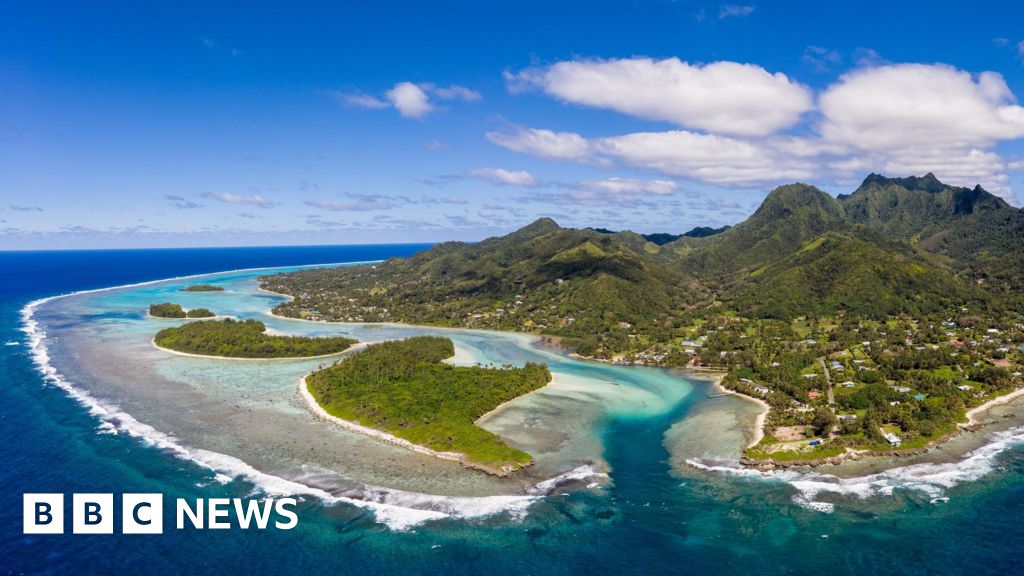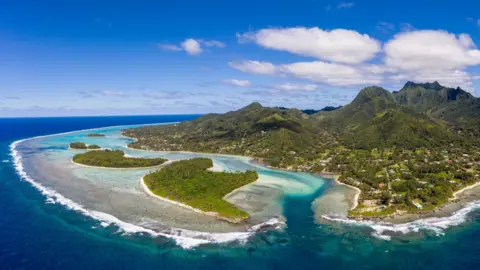
Cook Islands’ Growing Partnership with China Raises Concerns for New Zealand
By Kathryn Armstrong, BBC News

Getty Images
The Cook Islands is the latest Pacific nation to strengthen its relationship with China.
New Zealand has expressed concerns regarding the Cook Islands government’s transparency regarding its intention to establish a partnership with China. This week, Mark Brown, the leader of the small Pacific nation, is set to embark on a historic state visit to Beijing to finalize the agreement.
Prime Minister Christopher Luxon of New Zealand has conveyed that his country was not adequately consulted about these developments, leading him to describe the situation as a "dispute." The Cook Islands heavily depends on New Zealand under a long-standing “free association” agreement that offers defense and financial assistance. The advancing presence of China in the Pacific region has introduced a challenge to the United States and its allies, who have dominated the area for many years.
"We value our partnership with New Zealand and expect the same level of respect,” Brown stated during a recent press conference. He is scheduled to leave for China on Monday. “Conflicts, although challenging, are an unavoidable aspect of international relations, but they should not overshadow our overall engagement."
Brown asserted there is no dispute, emphasizing that the dialogue has been consistent, respectful, and open. He reiterated the Cook Islands’ right to make its own decisions as a self-governing nation. A spokesperson for China’s foreign ministry mentioned that both the Cook Islands and China are significant partners and affirmed their willingness to collaborate for mutual advancement.
"The relationship between China and the Cook Islands does not target any third-party nation and should remain unaffected by external influences," spokesman Guo Jiakun stated.
China established diplomatic relations with the Cook Islands in 1997 and has since been recognized as one of its development partners. Under the 60-year-old agreement, the Cook Islands operates with self-governance while remaining in a "free association" with New Zealand. Both governments are expected to collaborate on matters of defense and security. The new agreement with China is anticipated to encompass various sectors, including infrastructure, trade, and tourism.
One significant area of interest is deep-sea mining, which Brown believes could significantly boost the Cook Islands’ economy by unlocking valuable seabed minerals. However, this practice is controversial, particularly as critics argue it could worsen climate change effects, which the Cook Islands are already vulnerable to.
On Monday, Luxon remarked that while New Zealand shares "very good relations" with the Cook Islands and its citizens, there has been a lack of transparency in the current situation. When questioned about potentially withholding aid to the Cook Islands, similar to a recent move with Kiribati following a diplomatic issue, Luxon indicated he would first assess the contents of the agreement.
Given the free association agreement, residents of the Cook Islands can live, work, and access healthcare in New Zealand, benefits that some fear might be jeopardized if diplomatic relations sour further. Additionally, there has been criticism regarding the lack of public consultation by Brown and his administration prior to pursuing the agreement with China. Tina Browne, leader of the Democratic Party, labeled this oversight as "insane," and both she and fellow opposition leader Teariki Heather have voiced a loss of confidence in Brown’s leadership.
This comes despite Brown’s recent reversal on a contentious proposal to issue separate passports for Cook Islands citizens while allowing the retention of New Zealand citizenship— a plan Wellington rejected last year. The Cook Islands is not the only Pacific Island nation to align more closely with China; the Solomon Islands entered a security pact with Beijing in 2022, while countries such as Vanuatu and Papua New Guinea also maintain strong ties.









